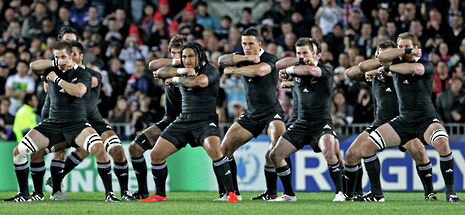Looking for love? Science says competitive sport may be the answer
Our obsession with sport may lie in social Darwinism. Sam Brown asks whether the beautiful game just boils down to an elaborate mating ritual.

Sport is ingrained in our public psyche. Conversation the day after a ‘big game’ can be dominated by the ins and outs of one athlete’s powerful or poor performance. On the face of it, our love affair with sport is an illogical and functionless one. Yet from the pentathlon of the ancient Olympics to the Super Bowl and FIFA World Cup of today, observing or participating in feats of athleticism are major pastimes for a majority of the world’s population. Why, then, do we watch with fascination as abnormally agile tennis players fling themselves across grass courts and behemoth-like rugby players brawl in mud over an egg-shaped bag of air?
For some, the answer lies in social Darwinism. In a recent issue of Perspectives in Biology and Medicine, Andreas de Block and Siegfried Dewitte from the University of Leuven in Belgium argue that: “From a Darwinian perspective, sports may be seen as one of the cultural activities invented to promote the acquisition of status… and acquiring status is – on average – beneficial to an individual’s reproductive success.” In other words, the medium of sport allows people to display evolutionary desirable traits, such as physical and mental prowess, to potential partners. The specific sport is irrelevant – it is simply the underlying athletic genes that makes sportspeople more subconsciously attractive in evolutionary terms. The rowing Blue beats the scarf-donning, Emily Dickinson-reading English student in this respect.
“A lack of lustful competition may translate into a dip in sporting achievement”
This link between sport and sexual competition is backed up by a study of male tennis players and their performance before and after marriage. In 2007, psychologists David Farrelly and Daniel Nettle investigated the performance of hundreds of professional male tennis players and found that their rankings significantly dropped after devoting themselves to a long-term sexual partner. A lack of lustful competition may translate into a dip in sporting achievement.
Playing a sport and possessing athletic ability is therefore analogous to a peacock’s ostentatious feathers or a bird-of-paradise’s mating dance. Much like how a male bird-of-paradise deploys an elaborate and outrageous mating dance to show how inefficient he can afford to be, so the too the footballer performs the largely pointless act of kicking a ball around to express their athleticism and abundance of skill. "Sports", de Block and Dewitte tell us, "may be understood as culturally invented courtship rituals."
“Watching your own gender play sports also allows you to identify and assess prospective leaders and followers”
This theory of sport as a complex mating act also explains the obsession of fans with certain sports. Ostensibly, the fact that men generally prefer watching other men play sports and women prefer watching other women goes against the ‘sport as sexual performance’ proposal. However, watching your own gender play sports also allows you to identify and assess prospective leaders and followers, as well as give you an ideal level of athleticism to aim for. This is why the most popular sports are the ones which best showcase the athletes’ positive evolutionary traits – strength, intelligence, endurance, speed etc. – with accuracy. This is partially why artificial performance enhancing drugs like anabolic steroids are so hated in sports: they make it difficult for fans to know accurately whether the feats of athleticism they are viewing are achievable and praiseworthy. For instance, learning that Lance Armstrong won his many titles with the aid of doping leaves us angry, many of us having invested in him as a pinnacle of athletic performance.

Tied-up with sport and Darwinism is the Freudian concept of ‘transference’ – the redirection of repressed desires, feelings, and aggression towards a new object. Sport is often viewed as the product of the need to transfer the energies you would normally direct towards fighting for a mate into a ‘civilised’ space or setting. In short, you throw your lacrosse ball extra-hard to release the pent-up, animalistic desires you would have previously utilised in fighting your sexual competition. While this repressed need for competition may not affect every aspect of our lives as some psychologists believe, it certainly finds an outlet in highly aggressive contact sports such as rugby and American football.
Sport is therefore a Darwinian outlet for repressed competitive desires, an elaborate mating ritual, and a means of showcasing ‘positive’ evolutionary traits. While debuting as a star centre in your college’s mixed netball cuppers quarter-final may not dramatically enhance your love life, it’s a step in the right direction. For others, four VKs and a mediocre sense of dancing-rhythm may better do the trick
 News / SU reluctantly registers controversial women’s soc18 December 2025
News / SU reluctantly registers controversial women’s soc18 December 2025 Features / Should I stay or should I go? Cambridge students and alumni reflect on how their memories stay with them15 December 2025
Features / Should I stay or should I go? Cambridge students and alumni reflect on how their memories stay with them15 December 2025 News / Dons warn PM about Vet School closure16 December 2025
News / Dons warn PM about Vet School closure16 December 2025 News / Cambridge study finds students learn better with notes than AI13 December 2025
News / Cambridge study finds students learn better with notes than AI13 December 2025 News / Uni registers controversial new women’s society28 November 2025
News / Uni registers controversial new women’s society28 November 2025










